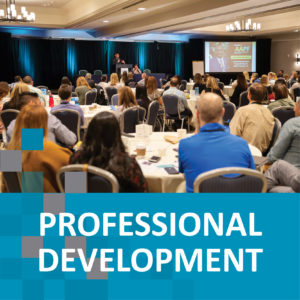By Deborah Good and Justin Trager, Future Focused Education.
High schools that re-engage youth who are off-track or dropped out (at-promise youth) have impacts well beyond a student’s graduation day. Graduating from high school is associated with a long list of positive life outcomes, including higher employment rates and wages, better health and mental health, and a greater likelihood of postsecondary education. In New Mexico, for example, a high school graduate is half as likely to be unemployed as peers who never finished school (American Community Survey).
Future Focused Education is an Albuquerque-based nonprofit organization that works to create healthier and more prosperous communities by advancing the best education for the students who need it the most. We facilitate the Leadership Schools Network (LSN), a network of choice across four high schools with a re-engagement mission and a shared three-pillar model: (1) community and industry engagement, (2) holistic student support, and (3) learning by doing.
Because the LSN schools target at-promise students, they do not fare well on traditional metrics of school success. In 2017, they embarked on a journey to identify mission-specific performance measures. Future Focused Education led the process, beginning with a series of appreciative inquiry interviews and culminating this year with the roll out of the LSN Integrated Data System. The system and associated tools help schools measure progress on their shared alternative measures.
LSN leaders identified alumni outcomes as essential, and have begun to measure postsecondary employment, enrollment in college or training programs, and credentials earned by their alumni. In the future, they hope to also measure the degree to which alumni have high-quality or meaningful work, although this will need further definition. The distinction between low- and high-quality employment is important because recent research out of Brookings demonstrates that adults from disadvantaged backgrounds were less likely to have high-quality jobs (Ross, M. A. et al., 2018).
Many traditional schools and districts rely on National Student Clearinghouse data to track college-going outcomes, but this tells a very incomplete story, as they do not include enrollment in workforce training programs, apprenticeships, and other forms of non-credit-bearing educational programs. The LSN schools have opted to rely on outreach to collect information from graduates, but this is not without its challenges.
Challenges collecting these data are twofold. The first challenge is human-centered. Traditional funding sources do not appropriate money for engaging alumni, and the LSN schools’ staff and leadership are already managing significant workloads and multiple priorities. Keeping in touch with graduates whose contact information changes frequently can be difficult. That said, the LSN schools have made alumni engagement a priority and engage AmeriCorps and Jesuit Volunteer Corps members to help the schools’ Community Engagement staff make phone calls, send text messages, and plan alumni events.
The second challenge is technical: Typical student information systems aren’t built for alumni data collection and, for the most part, the staff team tasked with tracking alumni data are not trained data analysts. They have done their best with Microsoft Excel skills, but maintaining alumni data and occasionally calculating aggregate outcomes or producing infographics has been difficult. Furthermore, if a staff member has a conversation with a graduate at a school event or runs into them at the grocery store, they don’t always remember to enter the data in their spreadsheet once they are back at their desk.
Future Focused Education recently partnered with a developer to help address this second, technical challenge. The Alumni Tracker is a mobile-friendly platform that helps staff easily enter information and access interactive data dashboards. The LSN is piloting the Alumni Tracker in Spring 2020 and is open to customizing it for other schools and programs. For more information, contact justin@futurefocusededucation.org.

